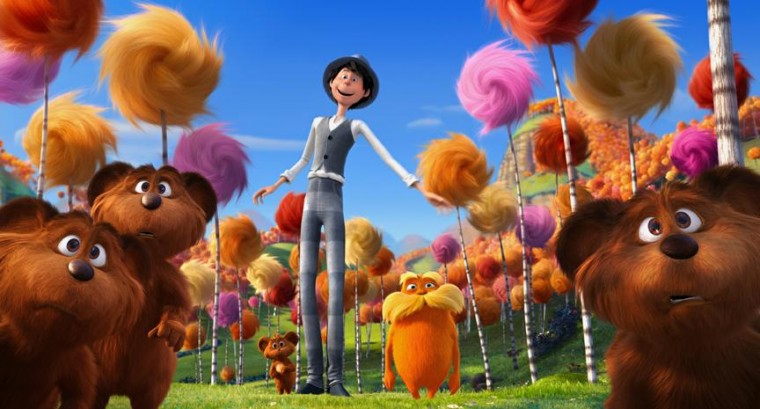
Adapted for the screen by the director of Despicable Me, Dr. Seuss’ The Lorax is boring and weightless. I don’t recall laughing audibly more than once at this would-be activist comedy.
The movie — and the story it is it based on — concerns the devastation of a once-fertile land and the cute, fuzzy creature that attempts to stop the destruction, but the similarities between book and film end there.
Outside of the locked-up, plastic city of Thneed-Ville (guarded by a steel wall reminiscent of The Truman Show), lies a Mordor-esque dead zone of smoke and ash. Our hero, Zac Efron (New Year’s Eve), makes it his mission to venture out into no man’s land to learn about trees, which no longer exist in the artificial city. In The Lorax film, trees, of course, are fun, brightly colored things used to attract another member of the human species in the springtime mating rituals.
The only reason Efron — who acts as flatly as four slashed tires — cares about that silly thing known as the environment in the first place is because he’s got a crush on Taylor Swift (the singer whose acting credits are limited to Valentine’s Day and an episode of CSI). His struggle to procure a tree has little to do with saving the planet and everything to do with demonstrating his masculinity and winning over his sweetheart.
Our villain, the misogynistic Mr. O’Hare (Rob Riggle of the failed Kleenex advertisement Big Miracle), sells bottled air and has made a fortune off of the ignorance of citizens in Thneed-Ville, which couldn’t possibly act as a mirror for any real society.
I mention Mr. O’Hare’s hate for women because The Lorax is a surprisingly intolerant film. There are several instances of disrespectful put-downs (including the “That’s a woman?” line seen in the film’s ubiquitous trailers). The most disturbing of these interactions is when Mr. O’Hare demands freshly baked cookies of Efron’s mother: When she returns with a plate of baked goods but interrupts Mr. O’Hare’s evil activities, he demands she goes “back downstairs” to the kitchen.
Even The Lorax’s pro-environment message is watered down by the film’s over-the-top conclusion. According to The Lorax, wiping out all of a land mass’s natural resources is perfectly fine, because 40 years later, the jerk who killed off Mother Nature will just happen to have one last tree seed that can magically reproduce an entire valley of plants and animals. There will also be an uplifting song to end this chapter of human shame.
The only bright spot in the movie is Ed Helms (The Office), who portrays The Once-ler by doing something called acting. The Once-ler is the film’s most developed character — he obliterates the forest despite the Lorax’s (Danny DeVito, It’s Always Sunny in Philadelphia) warnings because he wants to prove himself to his abusive family.
The Lorax had a lot of potential to be an entertaining film about why we should cherish the beauty around us, but it’s more interested in candy-colored animation than in seriously pursuing the message at the heart of Dr. Seuss’ work.
VERDICT: Unfunny, but pleasant to look at, Dr. Seuss’ The Lorax is another disappointment in Dr. Seuss film adaptations.
rhiggins@umdbk.com



